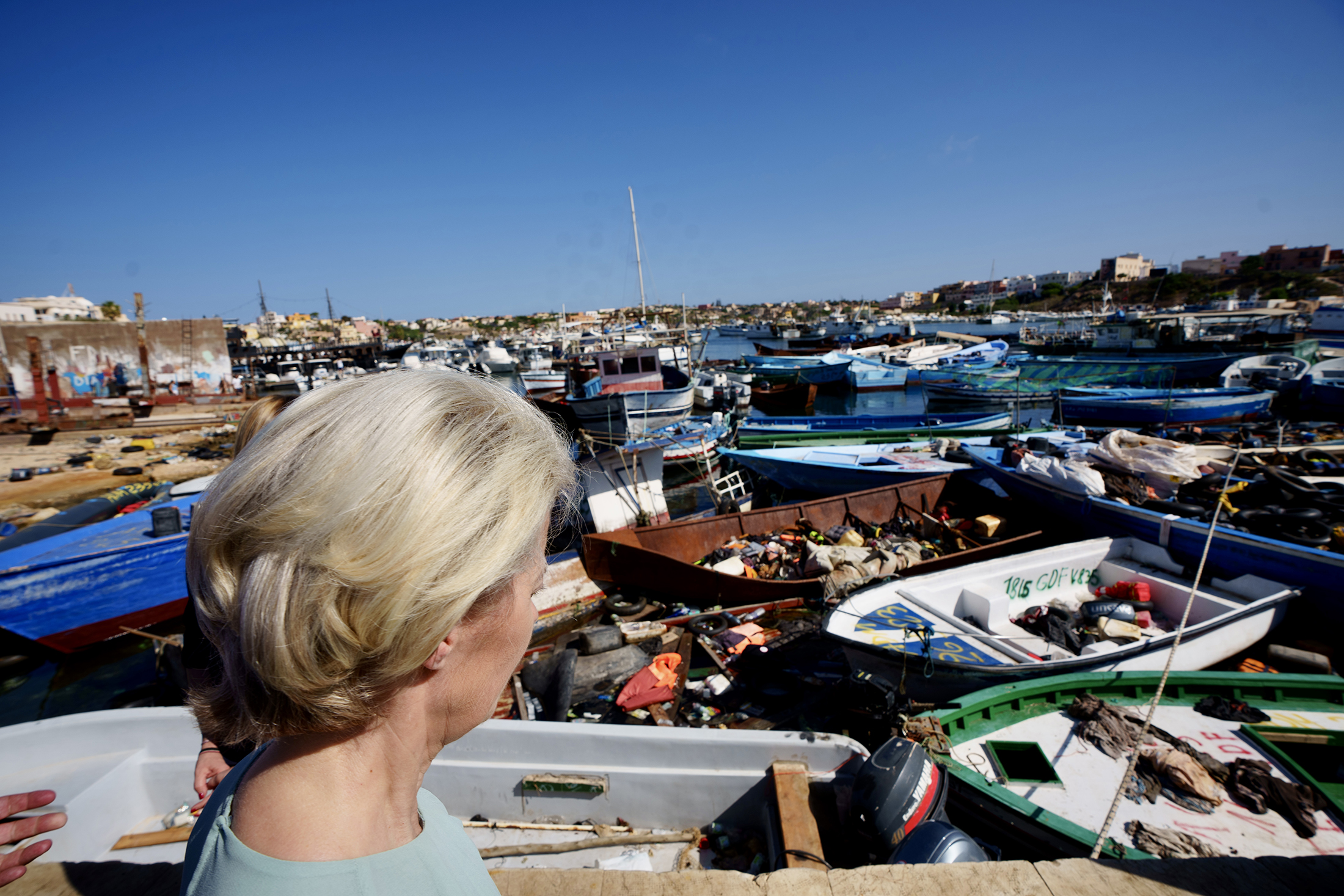Is von der Leyen’s new EU plan on illegal immigration really revolutionary?

The president of the EU Commission, von der Leyen, has presented a new plan to combat irregular immigration towards Italy. The Meloni government rejoices, but there is not much new in the EU's promises according to the correspondents of Radio Radicale and Repubblica from Brussels
“We will decide who arrives in the European Union and under what circumstances, not the traffickers.” It is one of the most significant phrases uttered by the President of the European Commission Ursula von der Leyen, who visited Lampedusa on Sunday and presented a plan to contain irregular immigration to Italy.
“A revolutionary thing happened in Lampedusa,” said Defense Minister Guido Crosetto: “for the first time there was talk of fighting smugglers.” The European plan "welcomes Italy's proposals", declared the Minister for European Affairs Raffaele Fitto. According to Fratelli d'Italia, Giorgia Meloni's government has achieved a "huge victory" which has directed the Commission towards the opening of "a European naval mission to combat illegal departures and traffickers".
In truth – as David Carretta , Radio Radicale correspondent from the European institutions, highlighted on
WHAT IS (NOT) NEW IN VON DER LEYEN'S PLAN ON MIGRANTS
As a first point, Von der Leyen promised Italy the support of the Commission, the European Union Agency for Asylum and Frontex (the European Border Guard Agency) for the registrations and identifications of migrants. This support is already foreseen.
On the second point, the Commissioner said that Italy will receive more support to relocate migrants out of Lampedusa and invited other EU member states to use the voluntary solidarity mechanism to encourage the relocation of migrants to Italy. In concrete terms, as Carretta wrote, it involves "a few million euros and a few hundred more relocations".
The third point concerns Frontex's support to the government to speed up repatriations and the sending of Margaritis Schinas (vice president of the European Commission) to the migrants' countries of origin to negotiate agreements of this type. Agreements which, however, the countries of origin tend not to sign: last year Italy repatriated less than three thousand migrants, Carretta wrote. Frontex support, however, already exists.
The fourth point consists in strengthening anti-trafficking efforts and cooperation with countries of origin and transit: with Tunisia, for example. This is a point already foreseen in the recent memorandum between Brussels and Tunis .
THE SOPHIA MISSION
The fifth point is the most relevant for the Meloni government, because von der Leyen promised a strengthening of surveillance of the Mediterranean Sea and an extension of existing naval missions, or the creation of new ones. As Carretta pointed out, “governments decide on missions. It was Salvini [at the time Minister of the Interior, ed. ] who asked to close Sophia out of obligation to save migrants".
The European naval mission Sophia had as its objective the fight against human trafficking and arms smuggling; it ended in March 2020, replaced by Operation Irini to monitor the arms embargo on Libya. Giorgia Meloni had very critical positions on the Sophia operation – she accused it, for example, of transporting irregular migrants to Italy -, yet now she seems to want to return.
As Repubblica 's Brussels correspondent, Claudio Tito, wrote, the reintroduction of the Sophia mission or an equivalent operation will require an agreement with the other member countries of the European Union, but it is a topic that, eight months before the European elections, “it risks convincing few allies”.
On the one hand, there is an economic question: the mission will have to be financed, and many European military resources have been concentrated on aid to Ukraine. On the other hand, there is a time factor: the restoration of a naval fleet will take at least six months: in the best case scenario, therefore, the operation would be launched in winter, when migratory flows are usually lower.
Lastly, to be effective, the mission should have a broader mandate: that is, it should be able to operate not only in international waters but also in Libyan and Tunisian waters or on the mainland, in such a way as to concretely counteract the logistics of traffickers.
THE LAST POINTS OF THE PLAN
In the sixth point, von der Leyen spoke of cooperation between European and Italian authorities for the removal and destruction of boats used by traffickers. This cooperation already exists.
The seventh point concerns the help of the Asylum Agency for the acceleration of asylum request procedures and for the rejection of unfounded ones. “In Italy there is a Constitution”, writes Carretta, “the guarantees to protect asylum seekers, including appeals, must be respected.
The eighth point refers to the establishment of humanitarian corridors and legal migration routes to combat traffickers: the European Union has already been discussing this for about ten years.
At the ninth point there is the promise of strengthening cooperation with the UNHCR (the United Nations High Commissioner for Refugees) and with the IOM (the International Organization for Migration) for assistance to migrants along the migratory routes and for voluntary repatriations. This cooperation already exists.
The tenth and final point concerns the acceleration of the implementation of the points of the memorandum of understanding with Tunisia, signed in July .
This is a machine translation from Italian language of a post published on Start Magazine at the URL https://www.startmag.it/mondo/piano-dieci-punti-von-der-leyen-contrasto-immigrazione/ on Mon, 18 Sep 2023 09:38:03 +0000.
